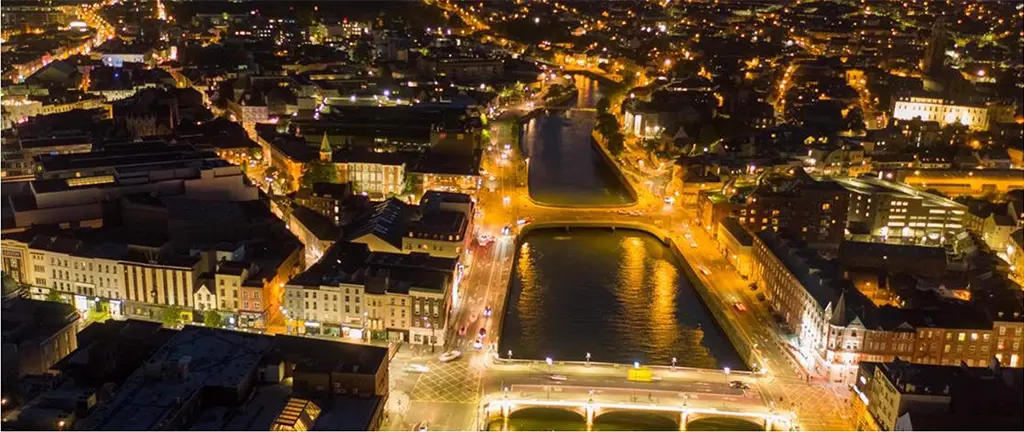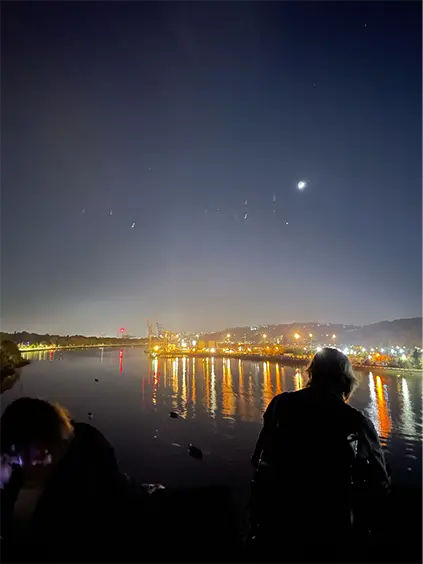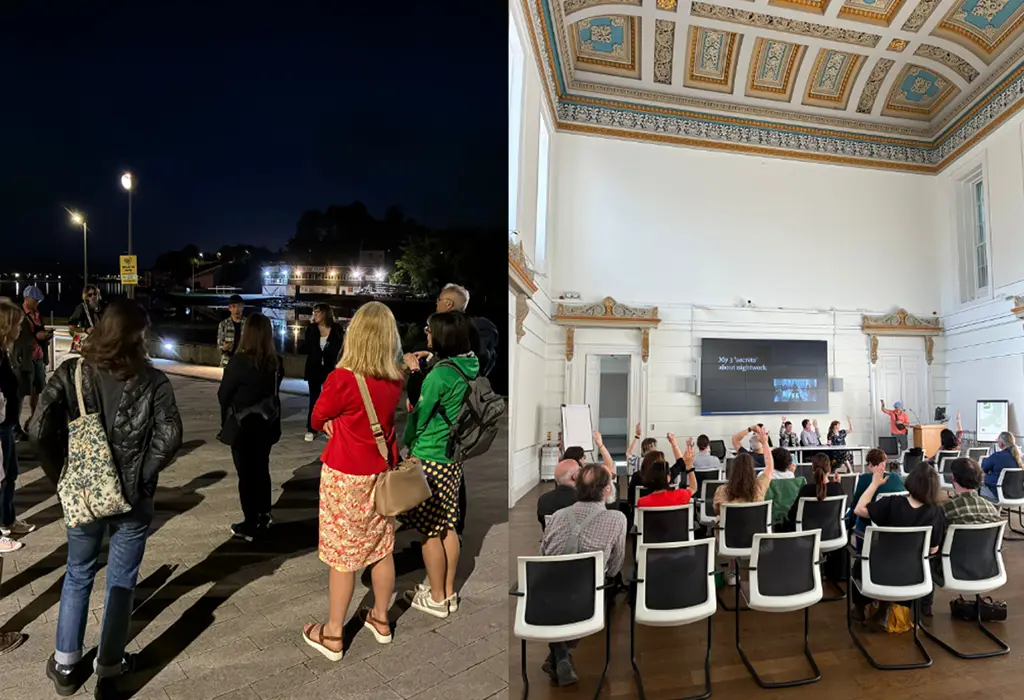In This Section

The Challenge
Night is traditionally a contested space: public order, criminality and security concerns have long been associated with the nocturnal city. This continues to be the case, but the disappearance of beloved entertainment venues during the recent Covid-19 pandemic has also highlighted night’s economic value.
Today’s policymakers and the media are therefore preoccupied by the challenges of nocturnal public safety, as well as the night-time economy. In the era of the 24/7 city and the imminent erasure of night’s shadows because of light pollution, the 'Dark Futures, Night Spaces' project is an interdisciplinary, community-engaged initiative that studies life after dark and reflects on what the nights of tomorrow should look like.
Bringing together academic researchers from UCC, Munster Technological University and Lancaster University, stakeholders from scientific educational institutions, and policymakers, we strive to:
- change public perception of the urban landscape after dark and expand understanding of night’s potential
- influence policymaking on the urban night
- raise awareness of the impact of the night-time economy on the environment and human and non-human well-being
Through public discussion, media coverage and community engagement, we encourage reflection on night’s potential as socio-cultural space and its role in urban regeneration, as well as sustainability, inclusivity, and environmentally responsible lighting design.
The Research
 Supported by my co-convenors (Giulia Bernuzzi, Silvia Ross, Barbara Siller) in the ‘Rethinking Spatial Humanities’ research cluster (CASiLaC) and building on the cluster’s track record in public engagement (e.g. ‘Cities and Flooding: Cork and Venice’, 2021) and its place within the Future Humanities Institute, I used my Night Studies expertise to plan an interdisciplinary, community-engaged event on nights of the future: a panel discussion, nightwalk and visit of the Blackrock Castle Observatory.
Supported by my co-convenors (Giulia Bernuzzi, Silvia Ross, Barbara Siller) in the ‘Rethinking Spatial Humanities’ research cluster (CASiLaC) and building on the cluster’s track record in public engagement (e.g. ‘Cities and Flooding: Cork and Venice’, 2021) and its place within the Future Humanities Institute, I used my Night Studies expertise to plan an interdisciplinary, community-engaged event on nights of the future: a panel discussion, nightwalk and visit of the Blackrock Castle Observatory.
Activities preceding the event consisted of discussion among the cluster, and collaborative meetings with stakeholders (academic researchers, educational institutions and policymakers).
Funding was secured from UCC’s Geography and French departments to invite guest speaker Nick Dunn (Professor of Urban Design and Director of the ‘Dark Design Lab’ at Lancaster University).
Contact was made with additional panelists: JC MacArie (UCC Sociology), policymaker Fiona Collins (Night-Time Economy Advisor to Cork City Council) and Niall Smith (Lecturer at Munster Technological University and Director of Blackrock Castle Observatory, a scientific educational institution which prioritizes community engagement) – thus promoting interinstitutional cooperation.
Support was secured from Cork University Business School in hosting the panel discussion in a key city-centre location, while the nightwalk expanded to explore night’s creative potential by including literary readings from poet Mary Noonan and Maureen O’Connor (UCC English).
The Impact
The ‘Dark Futures, Night Spaces’ project’s first major output took place on Wednesday, 30th April 2025. An evening of urban exploration, reflection and discovery, it attracted a wide public, thanks to intense media interest in the lead-up to the event. An op-ed article in Tuesday’s Echo newspaper and Wednesday morning interview on 96FM’s ‘Opinion Line’ generated much public curiosity, almost doubling attendance in the twenty-four hours beforehand.
Bringing together a range of local, national and international stakeholders, from creative practitioners and cultural experts, to scientists, anthropologists and policymakers, the event combined discussion with nightwalking and immersion in the nocturnal cityscape. The stakeholders’ diverse perspectives on the nights of yesterday, today and tomorrow, allowed informed reflection on night as a social, cultural, and economic phenomenon, as well as exploration of changes in the public’s relationship with the nocturnal space. Ultimately, this nocturnal experience promoted community engagement in Cork after dark, broadened public understanding of nighttime, and suggested future challenges and new directions for policymakers regarding nights of tomorrow.
 The panel discussion set the scene for what followed: a night walk from Cork city centre along the Marina towards Blackrock Castle Observatory where the evening ended with an after-hours tour and stargazing. Led by Nick Dunn (an urban design expert), the walk included literary readings, and social, historical and anthropological contributions. The public’s personal experience and sensuous impressions of the Cork night intersected with participants’ specialist knowledge of the city.
The panel discussion set the scene for what followed: a night walk from Cork city centre along the Marina towards Blackrock Castle Observatory where the evening ended with an after-hours tour and stargazing. Led by Nick Dunn (an urban design expert), the walk included literary readings, and social, historical and anthropological contributions. The public’s personal experience and sensuous impressions of the Cork night intersected with participants’ specialist knowledge of the city.
This interdisciplinary and community-engaged event identified a need for public reassurance regarding nocturnal safety as well as more ecologically-sound lighting choices, but it also explored night’s cultural potential (beyond pubs and nightclubs). The panel participants and Dr Berkery have additional planned outputs on these questions, including a joint international funding application and forthcoming publications (special issue of an interdisciplinary academic journal) which aim to bring together our findings from this event to inform policymakers on nights of the future and to include further research on night spaces in other European/non-European cities (e.g. my project ‘Mapping the Nightscape: Literary Street Scenes in Nineteenth-Century Cities’ which is in development for an ERC Starting Grant application, supported by Enterprise Ireland funding).
A follow-up interdisciplinary, public engagement event on ‘Nighttime Mobility and Inclusivity: Gender, Sexuality, Race’ is planned for the coming academic year. Grounded in exchange with policymakers, this will further drive change in public perception of the night.
The overall focus of this initiative is on nights of the future: informing on nighttime security and economy, but most importantly, going beyond this, to broaden the academic and wider communities’ understanding of night’s potential (as a unique ecological, social and cultural space).
The ongoing and planned impacts from these public engagement events and publications are varied:
Cultural and Social
- Shifting public perception of the night from the overwhelmingly negative outlook (preoccupied with public safety, criminality, light pollution) which characterizes current public discourse, to shape thinking on the future of the urban night and consider night’s potential as a unique ecological, socio-cultural space.
- Enriching people’s cultural lives by introducing alternative nocturnal activities (nightwalking as sensory and cultural experience, creative open-air experiences after dark e.g. literary readings, dance, theatrical performances, art installations).
Political
- Influencing debate and increasing understanding
- Influencing night-time policymaking to encourage regulation and responsible lighting design which considers both public safety and nighttime ecology (flora and fauna, light pollution, noise pollution)
- Improving nocturnal policymaking to consider night’s benefits to the wider public and community outreach
- Potential to address real-world urban problems and the future directions and challenges which face policymakers (e.g. regulation and responsible lighting design, gentrification, sustainability and inclusivity)
More Information
'Dark Futures, Night Spaces' Event
Op-ed article in Echo newspaper
Interview on Cork's 96FM 'Opinion Line'
Twitter Handle: @19thC_Charlotte
Email: cberkery@ucc.ie
"Dark Futures, Night Spaces’ transforms our experience of the urban night and provides new insights into the societal challenges of today, creating valuable opportunities for public and academic engagement with policymakers. What is ultimately at stake is how we understand the nocturnal city today"
- Dr Charlotte Berkery, Lecturer in French
College of Arts, Celtic Studies & Social Sciences
Coláiste na nEalaíon, an Léinn Cheiltigh agus na nEolaíochtaí Sóisialta
Contact us
College Office, Room G31 ,Ground Floor, Block B, O'Rahilly Building, UCC
